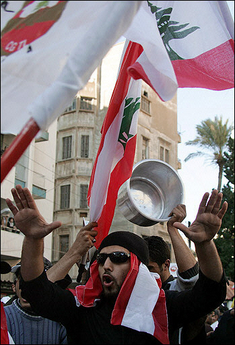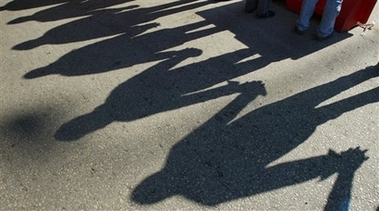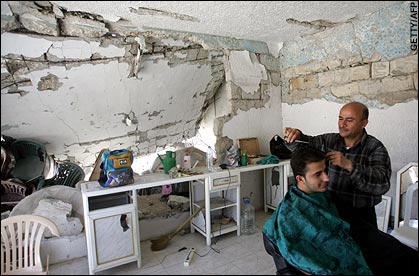 By Tom Perry BEIRUT, Jan 23 (Reuters) - Lebanon's opposition called on workers to go on strike on Tuesday in an escalation of its campaign against the government that is set to deepen the political crisis in the country. Hezbollah leader Sayyed Hassan Nasrallah, part of the opposition, called on Lebanese to observe the strike and be ready for more steps which the opposition might announce to press its demands for veto power in cabinet and new elections. Prime Minister Fouad Siniora's has shrugged off the demands, instead preparing for an international aid conference in Paris on Thursday that it hopes will yield billions of dollars for Lebanon's debt-laden economy.
By Tom Perry BEIRUT, Jan 23 (Reuters) - Lebanon's opposition called on workers to go on strike on Tuesday in an escalation of its campaign against the government that is set to deepen the political crisis in the country. Hezbollah leader Sayyed Hassan Nasrallah, part of the opposition, called on Lebanese to observe the strike and be ready for more steps which the opposition might announce to press its demands for veto power in cabinet and new elections. Prime Minister Fouad Siniora's has shrugged off the demands, instead preparing for an international aid conference in Paris on Thursday that it hopes will yield billions of dollars for Lebanon's debt-laden economy.
 Beirut, Jan 14 (DPA) The slogan 'I love life' is currently covering billboards around the Lebanese capital as the government and the opposition compete over who loves life and Lebanon more. It is a campaign used by the March 14 Coalition and has been countered by slogans from the opposition that read: 'We love life without debt or outside interferences.'The billboards represent the competition between Lebanon's government and its allies, and the opposition to show their love for Lebanon.'We love life with pride,' reads a billboard for the Lebanese Shia movement Hezbollah. A few metres away, a large billboard pasted up by the forces that support the government of Premier Fouad Seniora says: 'We want to live. We love life.'
Beirut, Jan 14 (DPA) The slogan 'I love life' is currently covering billboards around the Lebanese capital as the government and the opposition compete over who loves life and Lebanon more. It is a campaign used by the March 14 Coalition and has been countered by slogans from the opposition that read: 'We love life without debt or outside interferences.'The billboards represent the competition between Lebanon's government and its allies, and the opposition to show their love for Lebanon.'We love life with pride,' reads a billboard for the Lebanese Shia movement Hezbollah. A few metres away, a large billboard pasted up by the forces that support the government of Premier Fouad Seniora says: 'We want to live. We love life.'
Since Christmas, red-and-white posters were pasted up around Beirut proclaiming 'I love life' in Arabic, English and French in an apparent reaction to Hezbollah's culture of martyrdom. 'There is a group in Lebanon who advocate death and love war and they put the idea of military confrontation above any other consideration,' said a follower of the government. 'We are telling them not all the Lebanese back your views and we love to live.' Said Hezbollah's Zuheir Safieddine: 'This is silly. The government forces think only they love Lebanon and they love life, but we tell them we love Lebanon to be free from political, social, financial debt.'Opposition follower George Aoun remarked: 'We tell them (the government forces) that advertising never bought the trust of the people. Go invest in building constitutions and show goodwill in boosting the economic cycle.'
However, the billboards have angered some Lebanese who consider themselves neutral in the political crisis dividing the country. They criticise both sides for pulling the country into civil strife. One such critic is Najwa Baydoun, a Lebanese social worker.'Who are they (opposition and government forces) kidding? Human minds can be limited and blind sometimes, but they should not use the word 'love' in their political war,' said Baydoun.
 By Michael Hirst in Beirut, Sunday Telegraph, Talking politics is normally a favourite pastime in Lebanon. But after a summer of war and an autumn of government in deadlock, Beirut's shops, cafes and barbers have drawn a line under the heated national dialogue by banning all talk of current affairs on their premises.With the country's inter-religious tensions at levels not seen since the bitter civil war of the 1980s, the outcome of the trial of strength between the government and the Hizbollah-led opposition is on everyone's mind.But with little prospect of a swift resolution, and fed up with the custom lost due to a continuing six-week sit-in by Hizbollah protesters in central Beirut, many of the capital's businesses now want a polite silence.
By Michael Hirst in Beirut, Sunday Telegraph, Talking politics is normally a favourite pastime in Lebanon. But after a summer of war and an autumn of government in deadlock, Beirut's shops, cafes and barbers have drawn a line under the heated national dialogue by banning all talk of current affairs on their premises.With the country's inter-religious tensions at levels not seen since the bitter civil war of the 1980s, the outcome of the trial of strength between the government and the Hizbollah-led opposition is on everyone's mind.But with little prospect of a swift resolution, and fed up with the custom lost due to a continuing six-week sit-in by Hizbollah protesters in central Beirut, many of the capital's businesses now want a polite silence.
Banks have emailed staff requesting that they refrain from engaging in political conversation with customers, and some companies have gone as far as to block political websites from their computer systems."Signs are going up in shops, restaurants, nightclubs and even the backs of cars asking people to stop talking about politics," said Tarek Hamid, 42, who owns a boutique designer clothes shop in central Beirut. "If the politicians want to fight they should do it in the parliament and not go to the streets where they stop the people working."
By MAYSSA EL KHAZEN,
Introduction:
In today
Khazen History


Historical Feature:
Churches and Monasteries of the Khazen family

St. Anthony of Padua Church in Ballouneh
Mar Abda Church in Bakaatit Kanaan
Saint Michael Church in Bkaatouta
Saint Therese Church in Qolayaat
Saint Simeon Stylites (مار سمعان العامودي) Church In Ajaltoun
Virgin Mary Church (سيدة المعونات) in Sheilé
Assumption of Mary Church in Ballouneh
1 - The sword of the Maronite Prince
2 - LES KHAZEN CONSULS DE FRANCE
3 - LES MARONITES & LES KHAZEN
4 - LES MAAN & LES KHAZEN
5 - ORIGINE DE LA FAMILLE
Population Movements to Keserwan - The Khazens and The Maans
ما جاء عن الثورة في المقاطعة الكسروانية
ثورة أهالي كسروان على المشايخ الخوازنة وأسبابها
Origins of the "Prince of Maronite" Title
Growing diversity: the Khazin sheiks and the clergy in the first decades of the 18th century
Historical Members:
Barbar Beik El Khazen [English]
Patriach Toubia Kaiss El Khazen(Biography & Life Part1 Part2) (Arabic)
Patriach Youssef Dargham El Khazen (Cont'd)
Cheikh Bishara Jafal El Khazen
Patriarch Youssef Raji El Khazen
The Martyrs Cheikh Philippe & Cheikh Farid El Khazen
Cheikh Nawfal El Khazen (Consul De France)
Cheikh Hossun El Khazen (Consul De France)
Cheikh Abou-Nawfal El Khazen (Consul De France)
Cheikh Francis Abee Nader & his son Yousef
Cheikh Abou-Kanso El Khazen (Consul De France)
Cheikh Abou Nader El Khazen
Cheikh Chafic El Khazen
Cheikh Keserwan El Khazen
Cheikh Serhal El Khazen [English]
Cheikh Rafiq El Khazen [English]
Cheikh Hanna El Khazen
Cheikha Arzi El Khazen
Marie El Khazen